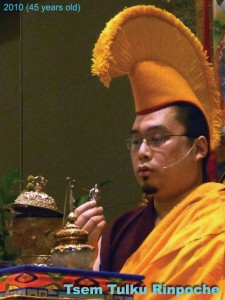The following is respectfully quoted from “Gurus for Hire Enlightenment for Sale” by Tsem Tulku Rinpoche:
If you are a member of the royalty of one country and you criticize your own royalty, its okay because inadvertently, you include yourself. For example, if I were in the royal family of a certain country and I criticized the royalty of my country, some people in our country or i the royal house may be a little unhappy, but it is generally acceptable because I have included myself in the criticism. I am showing humility and not pointing fingers at other people.
However, it would not be acceptable if I started saying that our royalty was very good, but the royalty of another country was excessive, stupid, not educated, spoiled and did not do anything for their country. Some people who are fanatical in our country might agree but the people who can think will see that it is not a very good policy and not very diplomatic. They will say that we do not have the full information, that we are just looking at things in the media and that we do not know the inside story. They will question our right to criticize another royal family of another country that people respect. Once we start saying those kinds of things, we invite criticism of our own royal family and we open the doors for other people to criticize us also.
Similarly, we have four sects of Buddhism in Tibet. Each sect has its own head but the four sects have the same goal, priorities and requirements for Enlightenment. All their teachings are textually and scripturally sound, based on reliable sources that come from India, stemming back to Lord Buddha himself.
I have not studied other lineages. I have read a little here and there but I can never claim to know anything about other lineages. However, i can tell you from observing the other lineages and erudite Gurus that I do not see a difference between them and the erudite masters of my lineage. They are compassionate, just as the ones in my lineage are. If a master of another lineage becomes a Buddha or becomes highly attained, I do not see them as different from a master of my lineage. Once he attains Enlightenment, a Buddha is a Buddha, without any lineage. Once we climb to the top of the mountain, it is what flag we put on the top of that mountain that identifies who we are. Actually, the person who climbs to the top is just a mountain climber who go to the top!
I can only say that the other lineages (besides Gelugpa) are definitely valid because I have checked out their masters, their students and disciples. I can say they are good because I look at the results. Just as in my own lineage (Gelugpa), they also have great practitioners and practitioners who do not really practice. It is the same. (I do not say this politically. If I say this politically, I can see through my motive and so can you.)
His Holiness the 14th Dalai Lama has mentioned this during teachings. What His Holiness says is correct. I believe it, but I am a critical person and will still check it out and think about it.
When one sect criticizes another sect, it is very, very serious. One sect has no right to criticize another sect. One sect has not fully studied another sect’s or another school’s tenets in order to have the knowledge to criticize or to say anything. That is why I would not ever criticize, even if I had studied it; and dare not since I have never studied it. I would not even go in that direction.
Prejudice and bias toward another sect or another form of Buddhism is dangerous, as explained in the Lamrim Chenmo. The karmic effect of saying negative things about other lineages is very damaging.
Let’s consider how dangerous it is to kill an animal; how bad the karma is to kill a person or a monk. We cannot kill a Buddha because a Buddha does not have the karma to be killed, but if we could kill a Buddha, imagine the incredible amount of negative karma that would arise from that action. The Lamrim says that if we spread sectarian views, it is understood, the other person accepts and we rejoice, the four completing actions or the four factors of intention are complete: the demerit of spreading sectarian views is equivalent to killing 1,000 Buddhas. That is what His Holiness Pabongkha Rinpoche explained in the Lamrim Chenmo.
If other people dare spread sectarian views, we should have great compassion for them, never listen and just cut their talk off. We should not entertain or listen to them. Remember, we are trying to gain merit! If the demerit of spreading sectarian views is equivalent to killing 1,000 Buddhas, then all the merit we create from doing prostrations, making offerings and meditating will down the drain! Symbolically, the amount of practice we do can fill up one bathtub. If we were to put that bathtub into the ocean, it becomes nothing. The karma of killing 1,000 Buddhas is like the ocean. When we engage in sectarian talk, it is like putting our little bathtub of merit into the ocean and wondering what happened!
If we were to judge another school or sect of Buddhism and say they are not as good as ours, then we are also presupposing that no attainments can be gained from their practice. It is saying that in their lineage, there are no enlightened Gurus, no high-level, attained teachers or practitioners. It is impossible. It cannot be!
Every lineage and every school of Buddhism in every country, everywhere, has elite, erudite, practiced masters who prove to us that if we practice each school individually and correctly, we will get the results. The techniques and the way the different schools are formed may differ a bit due to time, place, geography and culture but that does not mean they are not complete paths in themselves.
It is sectarianism to have biased views against another lineage, another school or another form, based on prejudice, ego, self-centeredness, insecurity, fear and ignorance; or to think that it might not be good if someone is not practicing what we are practicing.
You will never see, feel, hear or sense one bit of sectarianism in a real practitioner of Buddhism who wishes to become a fully enlightened Buddha for the benefit of others. Why would a real Dharma practitioner speak about something that was never on their mind? Why would they dwell on or express things that are not true? Real Buddhist practitioners do not lie or have baseless bias.
We cannot even be biased against other religions, as spoken by the perfect Buddha and as taught by the perfect Dalai Lama. If we cannot be biased against other religions, how can we be biased against different sects within our own religion?


